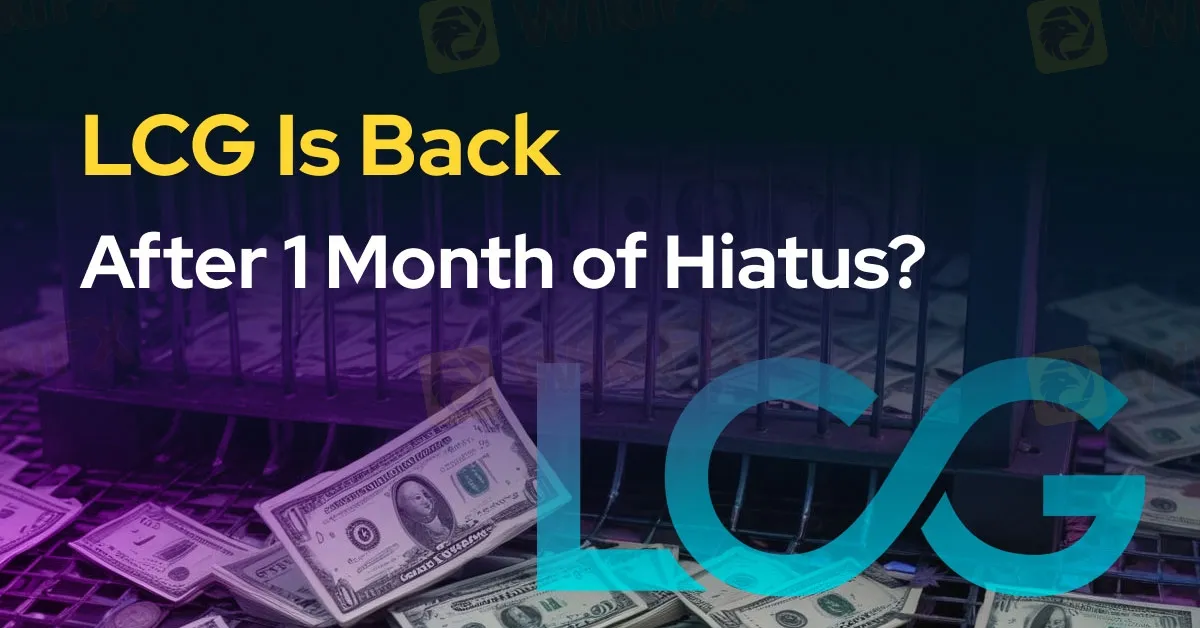简体中文
繁體中文
English
Pусский
日本語
ภาษาไทย
Tiếng Việt
Bahasa Indonesia
Español
हिन्दी
Filippiiniläinen
Français
Deutsch
Português
Türkçe
한국어
العربية
LCG Is Back After 1 Month of Hiatus?
Abstract:London Capital Group Ltd (LCG), a retail FX and CFDs broker based in London, has successfully resumed normal operations after temporarily halting the onboarding of new clients last month. This disruption followed the forced bankruptcy of LCG's parent company, FlowBank, in Switzerland, which led to some restrictions being placed on LCG's FCA license.

London Capital Group Ltd (LCG), a retail FX and CFDs broker based in London, has successfully resumed normal operations after temporarily halting the onboarding of new clients last month. Despite this pause, existing clients were allowed to continue opening positions with LCGs partner firms. This disruption followed the forced bankruptcy of LCG's parent company, FlowBank, in Switzerland, which led to some restrictions being placed on LCG's FCA license.
On the day FlowBank entered administration, June 13, LCG managers Dave Worsfold and Matt Basi were caught off guard by the unexpected event. They promptly engaged with the FCA, which required LCG to demonstrate its solvency in light of the situation with its parent company. In response, LCG requested temporary restrictions on its license while third-party experts were brought in to verify the company's financial stability.
After a thorough review, the FCA was satisfied that LCG is a solvent, standalone business. Consequently, all restrictions were lifted on July 8, allowing LCG to return to business as usual. The company now operates under a new Introducing Broker (IB) business model.

It's important to note that the UK-based, FCA-regulated LCG is distinct from the offshore LCG business in the Bahamas, despite the common ownership by FlowBank. The Bahamian entity, which also uses the lcg.com website but is managed directly by FlowBank under the brand FlowBroker, has ceased operations. There are no operational, financial, or business links between the two companies.
In a recent statement, LCG Managing Director Matt Basi described the past month as a validation of the company's decision to shift from a principal trading model to an Introducing Broker model in 2023. The transition has led to a significant reduction in the companys cost base by over 80% and marked its first instance of cashflow positivity in recent history.
Basi also highlighted the strong support received from the team, clients, and partners during this period. LCG achieved a record turnover month in June, surpassing £3bn in notional trade volume, and is on track to exceed this figure in July.
Looking ahead, LCG has ambitious plans, though specifics about these plans remain undisclosed. Basi noted that any potential change in control or equity purchase from the administrators would require prior approval from the FCA. The company is enthusiastic about the future and will provide more details as they become available.
With its operations back on track and a renewed focus on its IB model, LCG is well-positioned for a promising future, continuing to serve its clients and navigate the evolving financial landscape.
London Capital Group Ltd (LCG), a retail FX and CFDs broker based in London, has successfully resumed normal operations after temporarily halting the onboarding of new clients last month. Despite this pause, existing clients were allowed to continue opening positions with LCGs partner firms. This disruption followed the forced bankruptcy of LCG's parent company, FlowBank, in Switzerland, which led to some restrictions being placed on LCG's FCA license.
On the day FlowBank entered administration, June 13, LCG managers Dave Worsfold and Matt Basi were caught off guard by the unexpected event. They promptly engaged with the FCA, which required LCG to demonstrate its solvency in light of the situation with its parent company. In response, LCG requested temporary restrictions on its license while third-party experts were brought in to verify the company's financial stability.
After a thorough review, the FCA was satisfied that LCG is a solvent, standalone business. Consequently, all restrictions were lifted on July 8, allowing LCG to return to business as usual. The company now operates under a new Introducing Broker (IB) business model.
It's important to note that the UK-based, FCA-regulated LCG is distinct from the offshore LCG business in the Bahamas, despite the common ownership by FlowBank. The Bahamian entity, which also uses the lcg.com website but is managed directly by FlowBank under the brand FlowBroker, has ceased operations. There are no operational, financial, or business links between the two companies.
In a recent statement, LCG Managing Director Matt Basi described the past month as a validation of the company's decision to shift from a principal trading model to an Introducing Broker model in 2023. The transition has led to a significant reduction in the companys cost base by over 80% and marked its first instance of cashflow positivity in recent history.
Basi also highlighted the strong support received from the team, clients, and partners during this period. LCG achieved a record turnover month in June, surpassing £3bn in notional trade volume, and is on track to exceed this figure in July.
Looking ahead, LCG has ambitious plans, though specifics about these plans remain undisclosed. Basi noted that any potential change in control or equity purchase from the administrators would require prior approval from the FCA. The company is enthusiastic about the future and will provide more details as they become available.
With its operations back on track and a renewed focus on its IB model, LCG is well-positioned for a promising future, continuing to serve its clients and navigate the evolving financial landscape.

Disclaimer:
The views in this article only represent the author's personal views, and do not constitute investment advice on this platform. This platform does not guarantee the accuracy, completeness and timeliness of the information in the article, and will not be liable for any loss caused by the use of or reliance on the information in the article.
Read more

Top 5 Warning Signs- Why You Should Avoid MTrading Broker?
Before choosing a forex broker, it's crucial to spot red flags that could cost you. MTrading has raised concerns among traders, including delayed withdrawals, poor customer support, and questionable transparency. Users also report issues like slippage and platform glitches, which can harm your trading performance. In this article, we highlight the top 5 warning signs that explain why you should avoid MTrading broker and choose a more reliable alternative.

MarketsVox Exposed: The Tactics Draining Traders’ Hard-Earned Capital
Seeing MarketsVox as a forex broker, which can help you earn monumental profit on your investments? You have set your sights on the wrong option, unfortunately. The forex broker has been disallowing withdrawals, charging a much higher spread, and duping many traders under the pretext of high returns. Read on!

Top Forex Demo Accounts for Beginners
In this guide, we will explore the top forex demo accounts for beginners. We aim to help you find the best platform for your trading practice. Let's dive into the world of forex demo accounts and discover the best options available.

Investing in OnFin? Absurd Withdrawal Conditions & Trade Manipulation May Spoil Your Trading Mood
Planning to invest in OnFin, the forex broker, which has been a nightmare for many forex traders? While withdrawal denials have remained perennial for them, trading manipulations, including the illegitimate disappearance of deposits, have put OnFin under the scanner. Traders have been vehemently expressing their frustration about the forex broker on various broker review platforms. In this article, we will share some complaints that made us expose this broker here.
WikiFX Broker
Latest News
Datuk Seri Linked to RM8.4 Million Gold Investment Scam Under Police Probe
The Psychology Behind the Ascending Triangle Pattern in Forex
Charles Schwab Forex Review 2025: What Traders Should Know
The Global Inflation Outlook
What WikiFX Found When It Looked Into XS
ASIC Regulated Forex Brokers: A Comprehensive 2025 Guide
PrimeXBT Expands FSCA Licence and Enhances Crypto Services in 2025
How 3 Simple Steps Cost a Businessman INR 4 Crore in a Forex Scam
Is TradeEU Reliable in 2025?
Professional Forex Trading: Skills, Tools, & Strategies for Success
Currency Calculator


